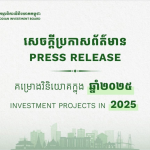Blockchain technology has emerged as a transformative innovation with the potential to revolutionize various sectors, including finance, supply chain, manufacturing, healthcare, and governance. Blockchain, at its core, is a decentralized, secure transaction ledger technology that ensures data integrity and immutability through cryptographic mechanisms. It offers transparency, decentralization, security, and the potential for smart contracts. Several nations such as the UK, the UAE, China, the Netherlands, Singapore, Australia, and Malaysia have followed a broad approach to encouraging industry to trial blockchain – an approach which could be applicable in Cambodia.
This document presents a comprehensive readiness assessment of Cambodia for the adoption of blockchain technology. It delves into the technical aspects of blockchain, explores its divers use cases, outlines strategies for successful implementation, highlights challenges associated with blockchain adoption and provides recommendations for policymakers and stakeholders.
The Royal Government of Cambodia has set two ambitious missions: becoming 1) an upper-middle-income country by 2030, and 2) a high-income country by 2050. Aligning with this vision, Cambodia is diversifying her economic development, particularly focusing on science, technology, and innovation (STI), in response to recent challenges, notably the impact of the COVID-19 pandemic and the recent international conflicts. Numerous policy instruments have been established including Cambodia’s STI Roadmap 2030, National Research Agenda 2025, Cambodia Digital Economy, Society Policy Framework 2020-2035, and other related policies. Hence, the context of Cambodia is favorable for blockchain technology adoption.
Blockchain technology offers an appealing solution for a wide range of applications by leveraging a decentralized network and cryptographic algorithms. This innovation ensures that all participants within the network can access identical information, consequently negating the necessity for intermediaries and mitigating the risk of fraud or tampering. This inherent characteristic holds immense promise in various sectors, such as finance, supply chain management, healthcare, public services and more. In financial sector, two notable cases come to fore: firstly, the “Bakong project” initiative by the National Bank of Cambodia, which advocates for a cashless society and bolsters financial inclusion by integrating multiple financial service providers into a unified system through an open API. Secondly, “Blockpay”, a blockchain-based remittance model streamlining cross-border money transfers. For supply chain management (SCM), two use cases are highlighted: the first, a case study in the auto parts industry, wherein a blockchain-based SCM model is proposed to enable the identification and tracking of automotive spare parts, optimize supply chain process and instigate business model innovations. The second instance unfolds in textile industry in Dhaka of Bangladesh. For healthcare sector, a noteworthy case study details the deployment of blockchain technology in the Vaccine Management System in Malaysia. This application enhances the government effort in combating COVID-19 by facilitating the distribution of medical supplies and charitable donations, bolstering traceability and security for both the vaccines and their recipients, and storing and generating vaccination information for cross-border travel. Lastly, an illustrative case study delves into the concept of “Building a Digital Government Powered by Blockchain” within the public service sector. The blockchain technology is harnessed to secure storage of government, citizen, and business data, streamline labor-intensive processes, reduce the likelihood of corruption and abuse, and amplify trust in government and online civic systems.
vii
Successful integration of blockchain technology relies on the effectiveness of implementation strategies. Given the relatively nascent nature of blockchain, there is a need to cultivate a proficient workforce through comprehensive educational and training programs. Simultaneously, efforts should be dedicated toward raising public awareness, fostering active engagement, and creating an ecosystem conducive for local startups and innovators. The dearth of familiarity with blockchain and its potential can constraint the involvement of both industry and policymaker in harnessing the technology’s full potential. Furthermore, the establishment of a robust regulatory framework is paramount; one that not only nurtures blockchain innovation but also safeguards the interests of consumers and investors. In this delicate balance, the foundation for blockchain’s successful assimilation into various sectors and industries is laid.
The adoption of blockchain technology, while offering a spectrum of advantages, does not come without its share of challenges. These challenges encompass prerequisites such as high-speed Internet connectivity, a consistent power supply, and substantial implementation costs. Moreover, the shortage of experts well-versed in blockchain technology in Cambodia poses a hurdle to its widespread adoption. Additionally, concerns arise regarding the scalability of blockchain networks, the persisting gender disparities in technology adoption, issues of financial inclusion, and the reliability of smart contracts. Furthermore, security and privacy concerns remain at the forefront, demanding comprehensive solutions harness the full potential of blockchain while mitigating associated risks.
Insights gained and analyses conducted by experts indicate that to rapidly advance positive socio-economic development through the integration of blockchain, Cambodia must establish a supportive ecosystem, including the adoption of a national strategy, enhanced collaboration, and improved infrastructure. Moreover, the Ministry of Industry, Science, Technology & Innovation needs to enact a comprehensive legal framework to ensure positive and inclusive impacts of blockchain at a manageable scale. Additionally, the National Council of Science, Technology & Innovation is identified as a suitable governmental entity to address cross-cutting issues related to blockchain. Finally, to cope with the growing demand for blockchain technology experts, Cambodia needs to swiftly implement task force and workforce planning. This involves creating a national-level task force, led by the National Council of Science, Technology & Innovation, to monitor blockchain technology development. Simultaneously, the government should strategically focus on human capital development, laying the foundation for higher education institutions in science, technology, and innovation to be well-prepared for research and development competence.






Leave a Reply
You must be logged in to post a comment.